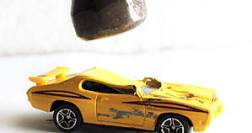Fritz Steinparzer, head of BMW's four-cylinder diesel engine development which is about to flood the world market with oil-burners that make a mockery of so-called green petrol-electric hybrids, says oil company bosses are not doing enough to help in the race to curb emissions.
Australia is one of a few large car markets in the world (the most notable being North America) where legislators have been accused of failing to hasten the clean up of dirty fuels.
Currently diesel sold in Australia can contain up to 50 parts per million of sulphur compared to the less than 15ppm that European countries are bound by.
Although it has to be said that companies in Australia, such as BP, are already selling diesel with a maximum of 10 parts per million of sulphur, two years before any Australian legislation requiring them to do so comes into effect.
But because the cleaner fuels, diesel and petrol, are not mandatory here Australia will miss the latest generation of BMW high-precision petrol engines that reduce average consumption by up to 16 per cent.
The third generation of diesel engines led by the two-litre turbo units and a stunning twin turbo 335i engine are further examples of how the development of such engines has slashed fuel consumption and drastically reduced emissions.
Steinparzer is critical of oil companies which, he says, should acknowledge the latest technology in petrol and diesel engines and make a concerted effort to reduce sulphur.
Steinparzer says oil companies make money out of taking sulphur out of the fuel in the refining process and selling it to chemical companies.
“In my opinion some of the oil companies make money by reducing sulphur in fuel so they can sell it to the chemical companies,” Steinparzer said.
“So what I'm saying is they (oil companies) should see this as a chance to reduce sulphur everywhere.”
But while BMW are like many car companies who stay ahead of the game by exceeding environmental targets, the next step the industry faces is to downsize.
“Our next step will be downsizing engines,” Norbert Praschak, project leader for BMW's four-cylinder diesel program said.
“It won't be lowering weight that has been a problem for all car companies.
“Weight reduction of petrol four-cylinder engines hasn't been as pronounced as the 15kW gain and 20 per cent fuel improvements.”
The car industry has come under fire for being No.1 villains when it comes to world pollution compared with other industries.
Johannes Liebl, BMW's “energy minister” in charge of making a litre go further, said the car industry had not presented itself in the best light before making a concerted effort to manufacturer vehicles that had a drastically reduced effect on the environment.
“But the problem now is the figures are not fair,” Liebl said.
“Traffic has a 16 per cent share in CO2 emissions and 12 per cent of that is passenger cars.
“But we are not leaning back and are satisfied that our cut is only 12 per cent.
“We are still trying to reduce emissions.
“There have always been groups in society who have wanted restrictions on the car industry and we are used to that.”
Since 1990, fuel consumption in vehicles has been improved by a massive 30 per cent and with BMW's “Efficient Dynamics” strategy there is plenty left in the tank to continue to cut fuel consumption.


.jpg)


.jpg)







.jpg)


.jpg)
.jpg)








.jpg)


Comments